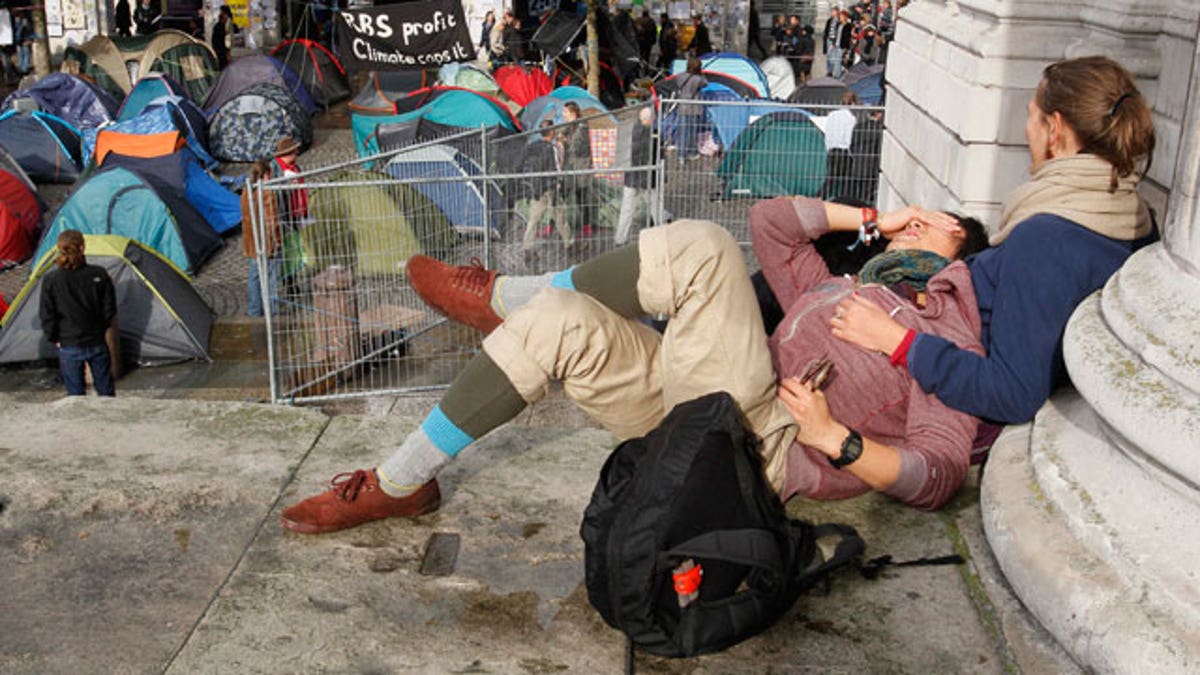
Oct. 27, 2011: People lie on the steps outside St Paul's Cathedral in London.
LONDON -- The senior St. Paul's Cathedral priest who welcomed anti-capitalist demonstrators to camp outside the London landmark resigned Thursday, saying he feared moves to evict the protesters could end in violence.
Other senior clergy and politicians urged the campers to leave peacefully, as the cathedral announced it would reopen to the public Friday after a weeklong closure triggered by the demonstrators' tents.
"In the name of God and mammon, go," London Mayor Boris Johnson said, using a Biblical turn of phrase to evoke the conflict between the spiritual and the material.
Resigning Canon Chancellor Giles Fraser said on Twitter that "it is with great regret and sadness that I have handed in my notice at St. Paul's Cathedral."
He told The Guardian newspaper that he had resigned because he believed cathedral officials had "set on a course of action that could mean there will be violence in the name of the church."
The cathedral and the protest tent city lie within London's traditional financial center, which is called the City.
Fraser's departure reveals divisions among cathedral clergy over how to handle the protest on their doorstep. Dean of St. Paul's Graeme Knowles confirmed Fraser had stepped down, saying officials were disappointed that he "is not able to continue to his work ... during these challenging days."
Protesters have been camped outside the building since Oct. 15. When police tried to move them the next day, Fraser said the demonstrators were welcome to stay and asked police officers to move instead.
He later issued a statement stressing that "the Christian gospel is profoundly committed to the needs of the poor and the dispossessed. Financial justice is a gospel imperative."
Days later, cathedral officials shut the building to the public, saying the campsite was a health and safety hazard. It was the first time the 300-year-old church, one of London's best-known buildings, had closed since World War II.
On Thursday, the cathedral said it would reopen after changes to the layout of the protesters' tents.
In a statement, St. Paul's said the church would open to worshippers and visitors with a special midday Eucharist service on Friday -- though the soaring dome and galleries will stay shut for now amid concerns about how long it would take to evacuate them.
Rev. Michael Colclough, Canon Pastor of St. Paul's, said Friday's service would "be remembering all those involved in the events of the past week and praying for a peaceful outcome."
The protesters say they plan to stay put, but senior church officials and politicians repeated calls Thursday for them to go. Bishop of London Richard Chartres promised to take up the demonstrators' cause if they left.
Writing in the Evening Standard newspaper, he asked them to "pack up your tents voluntarily and let us make you heard."
Similar camps have sprung up across the U.S. and around the world since activists took over a plaza near New York's Wall Street last month to protest corporate greed and social inequality.
Many have withered or been dismantled, sometimes by force.
The local governing authority for St. Paul's, the City of London Corporation, says it is taking legal advice on the best way to evict the protesters -- but that could be a long process, complicated by the tangled ownership of the medieval patch of London on which the cathedral stands.
The cathedral has said it is considering all its options in response to the protest -- including legal action.
The protesters say they will fight eviction and have hired high-profile lawyer John Cooper, who has said he will defend the group for free.
In a statement, the Occupy London protesters called Fraser a "man of great personal integrity."
The protesters said Fraser had "ensured that St. Paul's could be a sanctuary for us and that no violence could take place against peaceful protesters with a legitimate cause challenging and tackling social and economic injustice in London, the U.K. and beyond."
Fraser, 46, a high-profile and liberal Anglican clergyman, was appointed chancellor of the cathedral in 2009. The role involves overseeing the work of the St. Paul's Institute, which "seeks to bring Christian ethics to bear on our understanding of finance and economics."
Fraser, a former Vicar of Putney in south London whose father came from a prominent London Jewish family, is well known through his newspaper and magazine columns and frequent appearances on BBC radio.
He has criticized the effects of the government's austerity measures.
"Should the church get stuck into the mucky world of politics? How ridiculous, of course it should," he wrote in the Guardian in June, going on to quote the late Brazilian bishop Helder Camara: "When I give to the poor, they call me a saint. When I ask why they are poor, they call me a communist."
